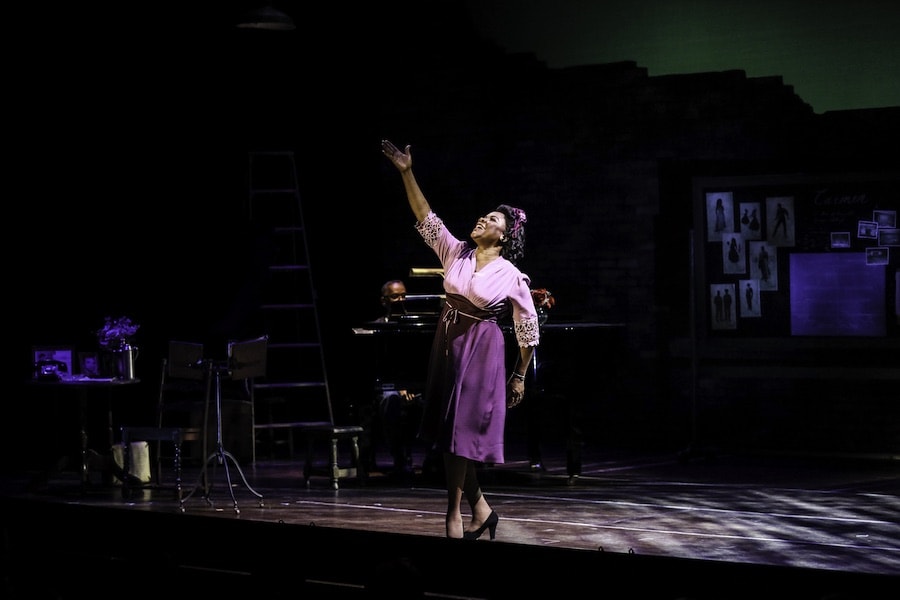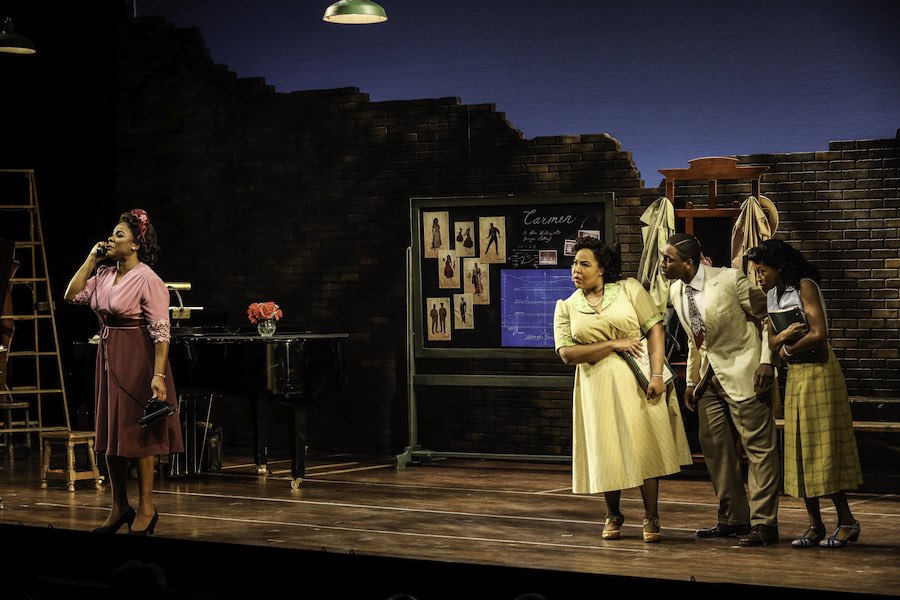In a note to the audience at Kennedy Center for the new play with music The Passion of Mary Cardwell Dawson, Tim O’Leary, general director of Washington National Opera, notes that Mary Cardwell Dawson is a name that “should have already been known to all of us in the opera world, but was not.”
Dawson (1894–1962) was an impressaria: a Black American opera singer who trained and mentored talented younger artists, produced performances, and formed the first African American opera company in the United States, the National Negro Opera Company. The Passion of Mary Cardwell Dawson is both a recounting of the aching waste of humanity and talent that the relentless systemic racism imposed on Black Americans at that time and an appreciation of the deep commitment on the part of Black American artists to resist the ongoing attempts to dehumanize them.
The word “passion” in the title refers both to the suffering and hardship she endured while producing opera performed by Black Americans and to the energy, joy, and determination that she brought to the task of ensuring that the public would know and experience this art, and the talented people that produced it.

This play focuses on preparations for a production of Bizet’s Carmen for which Cardwell, hoping to circumvent the apartheid rules of the time, has secured an outdoor space for the performance. But the threatening rain forces her to engage with the renters of a local hall once again and decide whether to give in to their demands of segregated seating or suffer the financial loss of having to cancel the performance, which will undoubtedly lead to the dissolution of the company. That is the bare-bones conflict of the play. It is effective for a number of reasons.
First is the playwright Sandra Seaton. Second is the director Kimille Howard. Third is the show’s star, Denyce Graves. If you’re like me, when you hear the word playwright, the image that comes to mind is literary: someone writing poetry, metaphor, and allegory in lyrical ways. We forget that the spelling of “wright” is not incidental; it suggests a type of work that is more blue-collar (for example, the work of a wheelwright), the work of forging together disparate parts into an integrated whole that will hopefully function reliably and predictably for years to come. Seaton’s work is a sturdy scaffolding for displaying lessons in history, demonstrations of intimidating operatic skill, and passing moments of humor and pathos. It is director Howard’s skillful management of the performances, set-sound-and-light cues, and staging that keeps all those disparate pieces of the scaffold balanced. It is Graves’s magnetic persona shifting seamlessly among the different aspects of that scaffolding, ably backed by her up-and-coming supporting cast, that keeps the audience exhilarated.

Underscored by the fluid yet focused accompaniment of renowned keyboardist Marvin Mills, the piece is structured around the last-minute rehearsals that Dawson is holding with her student performers in preparation for that evening’s performance of Carmen. What we see on stage is a series of master classes — conducted by a master instructor and glamorous performer — that are punctuated by desperate telephone calls, reflective monologs.
In each rehearsal/class segment, we get to watch as the neophyte singers progress from merely singing the notes to letting those notes inhabit their bodies, and allowing the roles to flow through those notes. We get to hear spirited renditions of the “Habañera,” the “Seguidilla,” and a few other hits from Carmen. Each of these segments received grateful and awed applause at both the student’s growth and the instructor’s ability to inspire and pull these performances from the students. The entire enterprise is tied up with a bow in the form of the highly evocative original music by Carlos Simon.
An opportunity to further explore the world of Mary Cardwell Dawson is being offered by IN Series. One of Dawson’s passions was Nathaniel Dett’s oratorio The Ordering of Moses. Dawson championed the work, and her flagship organization, the National Negro Opera Company, widely performed it throughout the United States, including a performance at Griffiths Stadium (now part of Howard University). The Ordering of Moses will be performed by IN Series in an immersive, site-specific performance at Mount Vernon United Methodist Church, 900 Massachusetts Avenue NW, on February 4 (6:30 pm), 5 (4:30 pm), and 11 (6:30 pm).
Finally, the exhibition, Introducing Mary Cardwell Dawson, which tells the story of Dawson’s life and the National Negro Opera Company through photographs and artifacts from the Dawson estate, will remain on display in the Kennedy Center’s Hall of States until February 1, 2023.
Running Time: Approximately 70 minutes without intermission.
The Passion of Mary Cardwell Dawson played for four performances between January 19 and January 22, 2023, in the Terrace Theater at the John F. Kennedy Center for the Performing Arts, 2700 F Street NW, Washington, DC.
The program for The Passion of Mary Cardwell Dawson is online here.
COVID Safety: Masks are optional in all Kennedy Center spaces for visitors and staff. If you prefer to wear a mask, you are welcome to do so. Kennedy Center’s COVID Safety Plan is here.
The Passion of Mary Cardwell Dawson
Music by Carlos Simon
Libretto by Sandra Seaton
In English with projected English subtitles
Directed by Kimille Howard
CAST
Denyce Graves (Mary Cardwell Dawson), Amber Monroe (Isabelle), Jonathan Pierce Rhodes (Frank), Tylor-Alexis DuPont (Phoebe)
Music Direction/Pianist: Marvin Mills
Assistant Director: Dustin Z. West
Surtitles: Kelley Rourke
Scenery Designer: James F. Rotondo
Costume Designer: Jessica Jahn
Lighting Designer: A. J. Guban
Sound Designer: Andrew Harper
Hair and Makeup Designer: Anika Seitu




